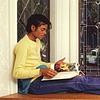Take a photo of a barcode or cover
adventurous
challenging
dark
Strong character development:
Yes
For a 600 page book not a lot actually happens. There's a whole lot of rape, murder, torture and fighting. There's some exploration of politics and religion in a post apocalyptic world run solely by children and teenagers. There's not a thick plot to sink your teeth into really. These children can't survive to adulthood mostly, they want a cure, those with the cure want slave soldiers to fight their wars. Cue lots of raping and killing. There is so much rape in this book and no sense of it, not just in war situations but part of the Armies every day life. The use of language is interesting once you get used to - I actually found myself thinking in 'Sengel' more than once! It be bone! You will love and hate Ice Cream Star. She frustrated me to no end but she had the truest heart of any character I ever came across. This book is filled to the brim with wonderful characters, these children who do hateful deeds yet love their families above anything. Some characters are full of evil deeds yet your heart bleeds for them every moment they are in peril or suffering emotionally. Eh, I would like a sequel as the ending was left ridiculously rushed and unfinished in my opinion.
adventurous
challenging
dark
tense
slow-paced
I admire the attempt to create a whole world complete with unique language, but think it ruined the book. It was incredibly hard to read. Also, it really bothered me that the transformed English creole language had such pidgin grammar. Research on how language evolves and develops strongly suggests that a new language like this would retain more sophisticated grammar.
I am so glad I don't have to read this book any more.
I am so glad I don't have to read this book any more.
I can't continue with this. Like someone else said, it reads too much like a white woman writing in a future Ebonics.
I looked through the reviews to try to find a black woman's (or any black person's) opinion of this book. I can't believe there are only white women reading & reviewing this (not that I'm helping by adding to them)? It would have been really, really nice to have a diverse opinion and perspective - especially when most of the characters here aren't white.
The Country of Ice Cream Star is dystopian-like book about basically two groups of people, and two characters. The groups: the natives of the post-pandemic United States and the Russians. The characters: Ice Cream Star (our protagonist) and Pasha, a Russian deserter.
Ice Cream (a black girl, 15yo) lives in a world in which all white people have been killed by an illness called WAKS, or posies as she calls it. People of color aren't totally immune, either, as they die between the ages of seventeen through twenty. Ice Cream's brother is eighteen, and he's contracted posies. Heartbroken, Ice Cream will do anything to get a cure, even if it means joining a war against the "roos" (the white people - Russians), and teaming up with Pasha.
According to the book's acknowledgments, the 580-page book used to be 900 pages long in the first draft. This . . . makes a lot of sense, because the plot becomes so muddled and messy - and it ends up feeling like the author fell too much in love with her own world that she couldn't form a concise plot with a beginning, middle, and end. There was even a spot near the very end in which the MC, Ice Cream Star, has this inner dialogue that attempts to wrap things up but doesn't do a decent job of it. And how could a couple paragraphs tie together over 500 pages of meandering and clutter?
Okay. A couple things:
- This book has a really intense dialogue. It's the form of English that Ice Cream Star, her "Sengles", and many other people in her area of the post-pandemic United States use.
- This book does not end happily. Do Not Read If You Want A Happy Ending. I find this ending almost offensive, too, because wow, another black woman with another unhappy ending. Another black woman tricked & taken advantage of by a white man. I hate it. It's not ""edgy"", it's not "ambitious", like the quote on the cover says. We've all seen this story before. Enough in real life.
On to what I really wanted to talk about: racial issues.
In an interview with Sandra Newman, she said ". . . the book isn’t about race – or it’s only very occasionally, tangentially, about race. It just suddenly felt like a real world I had discovered, rather than an imaginary world I was inventing."
Okay, if you're a white author writing about people of color, your book is automatically about race, I'm sorry. Especially if you're writing about people of color and the issues they face because of racial issues. You don't get a free pass because it feels different to you suddenly.
Reading the first 100 pages, I was thinking this book was the most interesting thing I've ever read - in a good way. And then after that, I realized it became the most interesting book I've ever read in the worst, most racist, awful, disgusting way.
It's all written with the assumption that, given an apocalypse of some kind and without the guidance of "civilized white people", people of color (and especially black people) will revert back to simple and violent lifestyles where rape and murder are common/expected. In contrast, the white people in the story that we're exposed to have retained all of their technology, have a cure for posies, among other things. The characters of color take relics and images left over from our version of the United States as "ultimate truths", such as Jesus Must Be White. I don't know if that was supposed to be ironic? But it makes my mouth just taste sour. The Marias, also, leave me confused. If they're supposed to be latin@, why do they call themselves spaniels, etc.? Kind of shows how the author's writing from a white perspective, because I would think even years, decades, etc. after our current time, latin@s wouldn't want to be referred to as "Spanish", the name colonists gave them . . .
Sandra Newman really takes the racism up a notch during the last 3/4 of the book, when Pasha gets to his tragic backstory. He tells Ice Cream about the wars in an African country called Lagos, and the place is described literally as a place "God made in His days of hatred". There's literally so many awful descriptors for this Terrible place and the Africans who live there, like "Africans love torture" and she describes in detail how white people killed and tortured these children in Lagos. Lagos, Africa. Why does this need to be described in detail? Why does this need to be included? Why Africa, specifically?
There's also this awful story in Pasha's past that the main character sympathizes with - a bit spoilery so It's revealed he killed an entire (African) family in grief and also because he believed the mother was essentially "shameful" for having a child with him, and it resulting in their daughter's death. Ice Cream actually tries to form an excuse for him, and readers naturally sympathize with the MC, which makes me gag.
There's also some homophobic passages that are really tough to read. Even though Ice Cream comes around and with one sentence tells the one minor gay character she understands, it doesn't seem enough to make right the book's already printed homophobia. When Ice Cream finds out her best friend from youth is gay, she's horrified. It also leads to her commanding Pasha to kill her friend's lover - literally out of spite. There's also a line under a list of things American white people did bad in the "olden days": "whites had a bad religion where they worship paper money. Was mally churces callen banks, deciding all their laws. These whites live like diseases, all was homosexual selfish."
Reading this as a wlw just made me incredibly uncomfortable.
Another problem reading this is that I really loved Ice Cream Star and hated her character being tossed around by the plot and its characters. And the ending, especially that ending. If ever there was a more unsatisfactory ending than this . . .
The Country of Ice Cream Star is dystopian-like book about basically two groups of people, and two characters. The groups: the natives of the post-pandemic United States and the Russians. The characters: Ice Cream Star (our protagonist) and Pasha, a Russian deserter.
Ice Cream (a black girl, 15yo) lives in a world in which all white people have been killed by an illness called WAKS, or posies as she calls it. People of color aren't totally immune, either, as they die between the ages of seventeen through twenty. Ice Cream's brother is eighteen, and he's contracted posies. Heartbroken, Ice Cream will do anything to get a cure, even if it means joining a war against the "roos" (the white people - Russians), and teaming up with Pasha.
According to the book's acknowledgments, the 580-page book used to be 900 pages long in the first draft. This . . . makes a lot of sense, because the plot becomes so muddled and messy - and it ends up feeling like the author fell too much in love with her own world that she couldn't form a concise plot with a beginning, middle, and end. There was even a spot near the very end in which the MC, Ice Cream Star, has this inner dialogue that attempts to wrap things up but doesn't do a decent job of it. And how could a couple paragraphs tie together over 500 pages of meandering and clutter?
Okay. A couple things:
- This book has a really intense dialogue. It's the form of English that Ice Cream Star, her "Sengles", and many other people in her area of the post-pandemic United States use.
-
On to what I really wanted to talk about: racial issues.
In an interview with Sandra Newman, she said ". . . the book isn’t about race – or it’s only very occasionally, tangentially, about race. It just suddenly felt like a real world I had discovered, rather than an imaginary world I was inventing."
Okay, if you're a white author writing about people of color, your book is automatically about race, I'm sorry. Especially if you're writing about people of color and the issues they face because of racial issues. You don't get a free pass because it feels different to you suddenly.
Reading the first 100 pages, I was thinking this book was the most interesting thing I've ever read - in a good way. And then after that, I realized it became the most interesting book I've ever read in the worst, most racist, awful, disgusting way.
It's all written with the assumption that, given an apocalypse of some kind and without the guidance of "civilized white people", people of color (and especially black people) will revert back to simple and violent lifestyles where rape and murder are common/expected. In contrast, the white people in the story that we're exposed to have retained all of their technology, have a cure for posies, among other things. The characters of color take relics and images left over from our version of the United States as "ultimate truths", such as Jesus Must Be White. I don't know if that was supposed to be ironic? But it makes my mouth just taste sour. The Marias, also, leave me confused. If they're supposed to be latin@, why do they call themselves spaniels, etc.? Kind of shows how the author's writing from a white perspective, because I would think even years, decades, etc. after our current time, latin@s wouldn't want to be referred to as "Spanish", the name colonists gave them . . .
Sandra Newman really takes the racism up a notch during the last 3/4 of the book, when Pasha gets to his tragic backstory. He tells Ice Cream about the wars in an African country called Lagos, and the place is described literally as a place "God made in His days of hatred". There's literally so many awful descriptors for this Terrible place and the Africans who live there, like "Africans love torture" and she describes in detail how white people killed and tortured these children in Lagos. Lagos, Africa. Why does this need to be described in detail? Why does this need to be included? Why Africa, specifically?
There's also this awful story in Pasha's past that the main character sympathizes with - a bit spoilery so
There's also some homophobic passages that are really tough to read. Even though Ice Cream comes around and with one sentence tells the one minor gay character she understands, it doesn't seem enough to make right the book's already printed homophobia. When Ice Cream finds out her best friend from youth is gay, she's horrified. It also leads to her commanding Pasha to kill her friend's lover - literally out of spite. There's also a line under a list of things American white people did bad in the "olden days": "whites had a bad religion where they worship paper money. Was mally churces callen banks, deciding all their laws. These whites live like diseases, all was homosexual selfish."
Reading this as a wlw just made me incredibly uncomfortable.
Another problem reading this is that I really loved Ice Cream Star and hated her character being tossed around by the plot and its characters. And the ending, especially that ending. If ever there was a more unsatisfactory ending than this . . .
Graphic: Rape, Slavery, Sexual harassment
Moderate: Homophobia, Pedophilia
This book is <a href="twitter.com/benjanun_s/status/1500449954783186944?s=21">blackfacing</a> and downright <a href="twitter.com/rmvirtues/status/1500353840108871684?s=21">racist</a>.
Brutal. Also resembles a primary source more than it does a novel - structure and arcs are shredded into the chaos of trying to survive with your dozens or hundreds or, finally, thousands of family in a shattered, isolated, extremely young society.
Ice Cream Star herself is a weird messy character - except everyone in the book is a weird messy character, for the simple reason of everyone being either under 20 or part of an amoral genocidal military. She didn't ring false to me, but she also mostly came off as overwhelmed - sure, she's a vain 15-year-old, but... well, 15 is 15, and it's less than a century past pandemic, and all the pop culture bits from approximately present day are still around. And it's not like there are
voices of learned reason hanging around.
It's not a perfect book, but it so successfully avoids so many cliches of dystopian/apocalyptic fiction that it feels groundbreaking, in a way that snuck up on me throughout reading.
Ice Cream Star herself is a weird messy character - except everyone in the book is a weird messy character, for the simple reason of everyone being either under 20 or part of an amoral genocidal military. She didn't ring false to me, but she also mostly came off as overwhelmed - sure, she's a vain 15-year-old, but... well, 15 is 15, and it's less than a century past pandemic, and all the pop culture bits from approximately present day are still around. And it's not like there are
voices of learned reason hanging around.
It's not a perfect book, but it so successfully avoids so many cliches of dystopian/apocalyptic fiction that it feels groundbreaking, in a way that snuck up on me throughout reading.
I capital L loved this book. It went from 'i appreciate and admire the language trick' to 'I am calling my cat bone and saying gratty to my wife when she brings me coffee. ' when the "real" English creeps in i found it off putting and wanted the dialect back.
can't recommend enough.
can't recommend enough.
http://wordnerdy.blogspot.com/2015/02/2015-book-41.html
This was one of those books that I enjoyed while I was reading it, but was never in a big hurry to pick up again once I'd put it down. I mean, it's set in the future, in an America where a plague kills everyone once they turn like 20, so bands of children have to make their way however they can. Ice Cream is 15, and her older brother now has the plague, and she's determined to find a cure--especially once they run into a man who claims to be thirty. But meanwhile, there's a fair amount of rape, violence, and other mayhem. It's not super pleasant reading, even though I was pretty invested in Ice Cream's story. Newman is doing some great things with language here, and her character names especially are pretty inspired. On the other hand, I definitely feel like this could have been shorter--things move really slowly until the second half of the book, which soon becomes even more relentlessly grim. I'm not sure about this one. It has a GREAT narrative voice, but it's really, really bleak. B.
This was one of those books that I enjoyed while I was reading it, but was never in a big hurry to pick up again once I'd put it down. I mean, it's set in the future, in an America where a plague kills everyone once they turn like 20, so bands of children have to make their way however they can. Ice Cream is 15, and her older brother now has the plague, and she's determined to find a cure--especially once they run into a man who claims to be thirty. But meanwhile, there's a fair amount of rape, violence, and other mayhem. It's not super pleasant reading, even though I was pretty invested in Ice Cream's story. Newman is doing some great things with language here, and her character names especially are pretty inspired. On the other hand, I definitely feel like this could have been shorter--things move really slowly until the second half of the book, which soon becomes even more relentlessly grim. I'm not sure about this one. It has a GREAT narrative voice, but it's really, really bleak. B.








